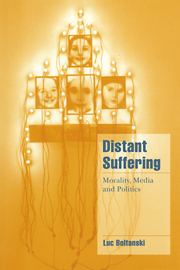10 - How realistic is action?
Published online by Cambridge University Press: 22 September 2009
Summary
Third uncertainty: the opacity of desire
We now broach the third kind of uncertainty deriving from suspicion cast on the authenticity of the altruistic and disinterested desire to help someone else which is supposedly translated into body language by emotion. This uncertainty is central to our subject. The unmasking of a hidden motive to fire a desire in television viewers to see suffering on the screen, for example, is a recurring theme of media criticism, especially of the criticism frequently made by journalists. To be sure, since the end of the nineteenth century criticism of ‘sensationalism’ has been a feature of the development of newspaper reporting which, when it claims to expose a reality the journalist has encountered first hand, is accused of pandering to the ‘unhealthy curiosity’ of the public ‘through the most detailed account of the most horrifying crimes’. Essentially this criticism is directed at the treatment of crime and sexual scandals. But over the last twenty years the diffusion of psychoanalysis, and of suspicious interpretations more generally, has made this uncertainty more extensive and given it an ability to appear plausible and resist denial which is clearly unprecedented. In this section we give some examples of how a recent insistence on desire and, at the same time, on its opacity, have bolstered the suspicions of impurity which have fallen on altruistic desire for two centuries.
- Type
- Chapter
- Information
- Distant SufferingMorality, Media and Politics, pp. 170 - 192Publisher: Cambridge University PressPrint publication year: 1999

